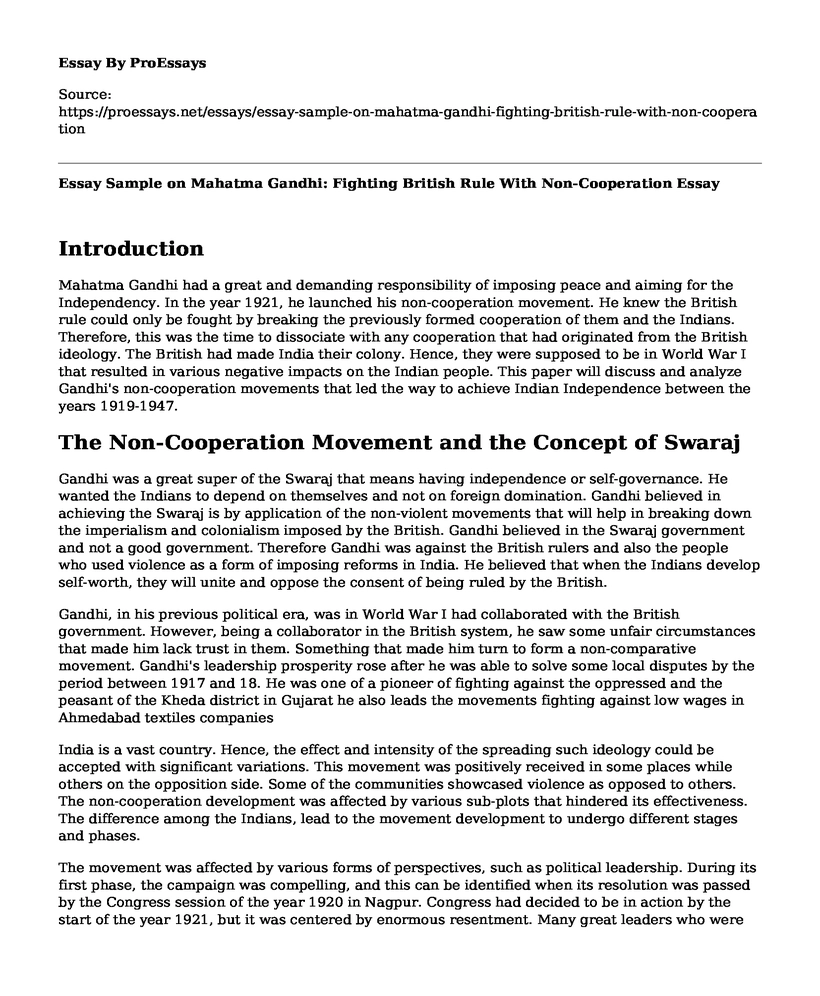Introduction
Mahatma Gandhi had a great and demanding responsibility of imposing peace and aiming for the Independency. In the year 1921, he launched his non-cooperation movement. He knew the British rule could only be fought by breaking the previously formed cooperation of them and the Indians. Therefore, this was the time to dissociate with any cooperation that had originated from the British ideology. The British had made India their colony. Hence, they were supposed to be in World War I that resulted in various negative impacts on the Indian people. This paper will discuss and analyze Gandhi's non-cooperation movements that led the way to achieve Indian Independence between the years 1919-1947.
The Non-Cooperation Movement and the Concept of Swaraj
Gandhi was a great super of the Swaraj that means having independence or self-governance. He wanted the Indians to depend on themselves and not on foreign domination. Gandhi believed in achieving the Swaraj is by application of the non-violent movements that will help in breaking down the imperialism and colonialism imposed by the British. Gandhi believed in the Swaraj government and not a good government. Therefore Gandhi was against the British rulers and also the people who used violence as a form of imposing reforms in India. He believed that when the Indians develop self-worth, they will unite and oppose the consent of being ruled by the British.
Gandhi, in his previous political era, was in World War I had collaborated with the British government. However, being a collaborator in the British system, he saw some unfair circumstances that made him lack trust in them. Something that made him turn to form a non-comparative movement. Gandhi's leadership prosperity rose after he was able to solve some local disputes by the period between 1917 and 18. He was one of a pioneer of fighting against the oppressed and the peasant of the Kheda district in Gujarat he also leads the movements fighting against low wages in Ahmedabad textiles companies
India is a vast country. Hence, the effect and intensity of the spreading such ideology could be accepted with significant variations. This movement was positively received in some places while others on the opposition side. Some of the communities showcased violence as opposed to others. The non-cooperation development was affected by various sub-plots that hindered its effectiveness. The difference among the Indians, lead to the movement development to undergo different stages and phases.
The movement was affected by various forms of perspectives, such as political leadership. During its first phase, the campaign was compelling, and this can be identified when its resolution was passed by the Congress session of the year 1920 in Nagpur. Congress had decided to be in action by the start of the year 1921, but it was centered by enormous resentment. Many great leaders who were thought to be loyal to the movement, such as Chittaranjan Das, cased to associate themselves as the followers of Gandhi. This movement was powerful, and many students were the main supporters. However, this marked it to be a famous movement to only the intelligentsia. Many scholars gave up their excellent jobs, and students left the government-sponsored schools. During this period, many schools engaged in various strikes and boycotts that marked as one of the significant concerns in coming up with the No-cooperation agenda.
Conclusion
However, Swaraj never propagated India to gain independence within one year, as predicted by Gandhi. The movement gained popularity to the masses, where they would hold protest against the foreign dominion. Both Muslims and Hindus came into harmony to achieve self-governance. The campaign made the Indian industries flourish as the Indians could only purchase from the local merchants and mill owners. This movement made Gandhi as one of the more celebrated leaders, a leader of the masses.
Cite this page
Essay Sample on Mahatma Gandhi: Fighting British Rule With Non-Cooperation. (2023, Mar 14). Retrieved from https://proessays.net/essays/essay-sample-on-mahatma-gandhi-fighting-british-rule-with-non-cooperation
If you are the original author of this essay and no longer wish to have it published on the ProEssays website, please click below to request its removal:
- Essay Sample on Pre-Colonization History of the Native Americans in Texas
- Jonah The Prophet Biographical Essay
- Greek Mythology: Trojan War Essay Example
- Vietnam War Literature Review Paper Example
- Essay Example on 4 Global Threats: Globalization, Climate Change, War, Tech
- Biography Sample on Jane Addams: Champion of Peace, Philanthropy, Work Ethic
- Paper Sample on Yemen: World's Worst Humanitarian Crisis of the Decade







